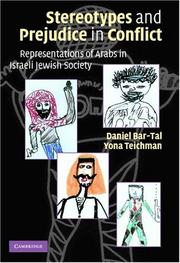| Listing 1 - 2 of 2 |
Sort by
|

ISBN: 0521807972 Year: 2004 Publisher: New York : Cambridge University Press,
Abstract | Keywords | Export | Availability | Bookmark
 Loading...
Loading...Choose an application
- Reference Manager
- EndNote
- RefWorks (Direct export to RefWorks)
Focusing on the issue of Arab representation in the Israeli-Jewish society, this study describes the negative intergroup psychological repertoire about the enemy (Arabs) that evolves in the context of intractable conflict (Arab-Israeli conflict). This analysis is of special importance because the negative psychological intergroup repertoire feeds the continuation of the conflict, and thus, serves as a major obstacle to conflict resolution and the peace making process. The major challenge of changing the negative psychological intergroup repertoire is emphasized.
Palestinian Arabs --- Public opinion --- Jews --- Stereotypes (Social psychology) in mass media. --- Prejudices --- Multicultural education --- Social conflict --- Intergroup relations --- Palestiniens --- Opinion publique --- Juifs --- Stéréotypes dans les médias --- Préjugés --- Education interculturelle --- Conflits sociaux --- Relations intergroupes --- Public opinion. --- Attitudes. --- Psychological aspects. --- Attitudes --- Aspect psychologique --- Israel --- Israël --- Ethnic relations. --- Relations interethniques --- Stereotypes (Social psychology) in mass media

ISBN: 9780511499814 9780521807975 9780521127035 0511499817 0511082037 9780511082030 0521807972 1280433698 9781280433696 9786610433698 6610433690 0511081588 9780511081583 0511171331 9780511171338 0511197039 9780511197031 0511298420 9780511298424 0521807972 0521127033 1107131545 9781107131545 Year: 2005 Publisher: Cambridge New York Cambridge University Press
Abstract | Keywords | Export | Availability | Bookmark
 Loading...
Loading...Choose an application
- Reference Manager
- EndNote
- RefWorks (Direct export to RefWorks)
In the last two decades, the study of social stereotypes and prejudice has become one of the central interests in social psychology in particular. One reflection of this growing interest is the focus on shared stereotypes and prejudices. The primary reason for this development is the recognition that stereotypes and prejudice play a determinative role in shaping intergroup relations. In situations of conflict, they are simultaneously outcomes of the accumulated animosity between the involved groups and also feed on the continuation of the conflict by furnishing the cognitive-affective basis for the experienced mistrust by the parties. In spite of this recognition, no systematic analysis of the stereotypes and prejudice was carried out in real situations. This book tries to rectify this by applying a general and universal conceptual framework to the study of the acquisition and development of stereotypes and prejudice in a society involved in an intractable conflict.
Palestinian Arabs --- Public opinion --- Jews --- Stereotypes (Social psychology) in mass media --- Prejudices --- Multicultural education --- Social conflict --- Intergroup relations --- Conflict, Intergroup --- Intergroup conflict --- Relations, Intergroup --- Social interaction --- Bias (Psychology) --- Prejudgments --- Prejudice --- Prejudices and antipathies --- Attitude (Psychology) --- Emotions --- Stereotype (Psychology) in mass media --- Mass media --- Arab Palestinians --- Arabs --- Arabs in Palestine --- Palestinians --- Ethnology --- Public opinion. --- Attitudes. --- Psychological aspects. --- Israel --- Ethnic relations. --- Stereotypes (Social psychology) in mass media. --- Health Sciences --- Psychiatry & Psychology
| Listing 1 - 2 of 2 |
Sort by
|

 Search
Search Feedback
Feedback About UniCat
About UniCat  Help
Help News
News